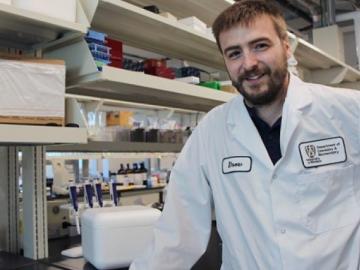
Filter News
Area of Research
- (-) Isotopes (8)
- (-) National Security (21)
- (-) Neutron Science (41)
- (-) Nuclear Science and Technology (14)
- Advanced Manufacturing (5)
- Biological Systems (1)
- Biology and Environment (34)
- Computational Biology (2)
- Computational Engineering (1)
- Computer Science (3)
- Electricity and Smart Grid (3)
- Energy Science (86)
- Functional Materials for Energy (1)
- Fusion and Fission (28)
- Fusion Energy (15)
- Isotope Development and Production (1)
- Materials (101)
- Materials Characterization (1)
- Materials for Computing (18)
- Materials Under Extremes (1)
- Quantum information Science (1)
- Sensors and Controls (2)
- Supercomputing (49)
- Transportation Systems (1)
News Topics
- (-) Biomedical (24)
- (-) Coronavirus (13)
- (-) Fusion (10)
- (-) Grid (6)
- (-) Materials Science (28)
- (-) Polymers (1)
- (-) Security (12)
- 3-D Printing/Advanced Manufacturing (12)
- Advanced Reactors (12)
- Artificial Intelligence (18)
- Big Data (8)
- Bioenergy (11)
- Biology (11)
- Biotechnology (2)
- Buildings (1)
- Chemical Sciences (5)
- Clean Water (2)
- Composites (1)
- Computer Science (33)
- Cybersecurity (19)
- Energy Storage (9)
- Environment (14)
- Exascale Computing (1)
- Fossil Energy (1)
- Frontier (2)
- High-Performance Computing (6)
- Hydropower (1)
- Irradiation (1)
- Isotopes (30)
- Machine Learning (15)
- Materials (20)
- Mathematics (1)
- Microscopy (3)
- Molten Salt (4)
- Nanotechnology (11)
- National Security (36)
- Neutron Science (122)
- Nuclear Energy (44)
- Partnerships (5)
- Physics (11)
- Quantum Computing (1)
- Quantum Science (8)
- Simulation (1)
- Space Exploration (11)
- Summit (7)
- Transportation (7)
Media Contacts

Temperatures hotter than the center of the sun. Magnetic fields hundreds of thousands of times stronger than the earth’s. Neutrons energetic enough to change the structure of a material entirely.

Oak Ridge National Laboratory researchers have discovered a better way to separate actinium-227, a rare isotope essential for an FDA-approved cancer treatment.

Does vaping and smoking e-cigarettes put you at higher risk of COVID-19 complications? UWindsor’s Drew Marquardt is trying to answer that question with research into how the toxicants in the oils of vapes and e-cigarettes affect lung function.

Scientists at the Department of Energy Manufacturing Demonstration Facility at ORNL have their eyes on the prize: the Transformational Challenge Reactor, or TCR, a microreactor built using 3D printing and other new approaches that will be up and running by 2023.

Research by an international team led by Duke University and the Department of Energy’s Oak Ridge National Laboratory scientists could speed the way to safer rechargeable batteries for consumer electronics such as laptops and cellphones.

With Tennessee schools online for the rest of the school year, researchers at ORNL are making remote learning more engaging by “Zooming” into virtual classrooms to tell students about their science and their work at a national laboratory.

Oak Ridge National Laboratory’s high-resolution population distribution database, LandScan USA, became permanently available to researchers in time to aid the response to the novel coronavirus pandemic.

In the race to identify solutions to the COVID-19 pandemic, researchers at the Department of Energy’s Oak Ridge National Laboratory are joining the fight by applying expertise in computational science, advanced manufacturing, data science and neutron science.

As a teenager, Kat Royston had a lot of questions. Then an advanced-placement class in physics convinced her all the answers were out there.



